Publications
Total 101건
-
 Jesse W. Campbell. (2014) Identification and Performance Management: An Assessment of Change-Oriented Behavior in Public Organizations. Public Personnel Management.
Jesse W. Campbell. (2014) Identification and Performance Management: An Assessment of Change-Oriented Behavior in Public Organizations. Public Personnel Management.This study develops a theoretical framework linking performance management (PM) to change-oriented organizational citizenship behavior, an extra-role employee activity aimed at improving organizational functioning by introducing micro-level change. The role of organizational identification as a mediating mechanism linking PM to change-oriented behavior is also explored. Using survey data gathered from employees of central government ministries in South Korea, structural equation modeling and bias-corrected bootstrap confidence intervals are used to test a number of empirical hypotheses related to the constructs mentioned above. The results of the analysis suggest that PM has a positive effect on change-oriented behavior, but that its effect is primarily due to its positive relationship with identification. Following a presentation of the results of the analysis, the theoretical and practical implications of this study are discussed.
2024-03-21
Read More -
 Jesse W. Campbell, Tobin Im and Jisu Jeong. (2014) Internal Efficiency and Turnover Intention - Evidence from Local Government in South Korea. Public Personnel Management 43(2). 259-282
Jesse W. Campbell, Tobin Im and Jisu Jeong. (2014) Internal Efficiency and Turnover Intention - Evidence from Local Government in South Korea. Public Personnel Management 43(2). 259-282All around the world, public organizations have faced strong pressures to improve performance and generally "do more with less," particularly following the global slowdown of 2008. This article examines the effects of organizational emphasis on efficiency in local government using data from a large survey of civil servants in South Korea. Findings from a fixed effects analysis indicate that higher levels of efficiency emphasis are related to stronger employee turnover intention. However, a number of moderating factors are also uncovered, suggesting that individual levels of public service motivation as well as perceived procedural justice and innovation climate can influence this relationship, lessening the impact of efficiency emphasis on turnover intention. These individual and organizational level factors may thus act as a buffer for increased performance demands. A number of implications for public management are discussed.
2024-03-21
Read More -
 Tobin Im, Wonhyuk Cho, Greg Porumbescu and Jungho Park. (2014) Internet, Trust in Government, and Citizen Compliance. Journal of Public Administration Research and Theory 24(3). 741-763
Tobin Im, Wonhyuk Cho, Greg Porumbescu and Jungho Park. (2014) Internet, Trust in Government, and Citizen Compliance. Journal of Public Administration Research and Theory 24(3). 741-763This research investigates how levels of citizen trust in government and compliance are affected by citizens' use of the Internet. Starting from the premise that information is a key determinant of public opinion and citizen behavior, this research explores the extent to which the time that citizens spend on the Internet affects their trust in government and compliance with government policies, compared with the influence of the traditional, offline, mass media modalities, such as newspapers. In addition, we also assess the impact of citizens' use of e-government on levels of trust in government and compliance. The results of the analyses suggest that the more time individuals spend on the Internet, the lower their degree of trust in government and lower level of citizen compliance. However, our results also suggest that such negative effects of the Internet can be moderated through citizens' increased use of e-government.
2024-03-21
Read More -
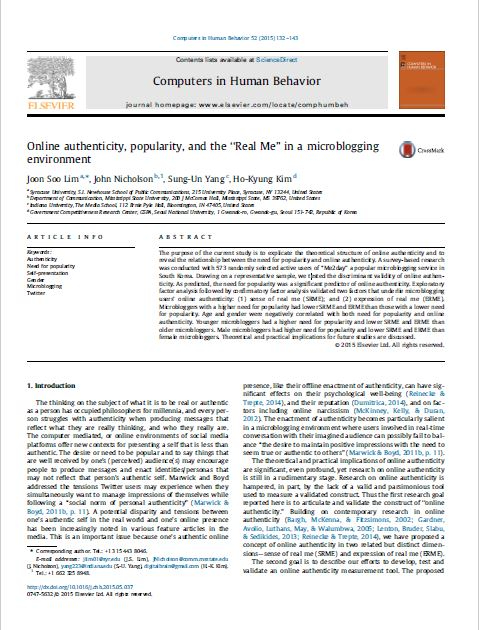 J.S. Lim, J. Nicholson, S.U. Yang and H.K. Kim. (2015) Online Authenticity, Popularity, and the “Real Me” in a Microblogging Environment. Computers in Human Behavior.
J.S. Lim, J. Nicholson, S.U. Yang and H.K. Kim. (2015) Online Authenticity, Popularity, and the “Real Me” in a Microblogging Environment. Computers in Human Behavior.The purpose of the current study is to explicate the theoretical structure of online authenticity and to reveal the relationship between the need for popularity (NFP) and online authenticity. A survey-based research was conducted with 573 randomly selected active users of a popular microblogging service in South Korea. Drawing on a representative sample, we tested the discriminant validity of online authenticity. Exploratory factor analysis (EFA) followed by confirmatory factor analysis (CFA) validated two factors that underlie microblogging users’ online authenticity: sense of real me (SRME) and expression of real me (ERME). As hypothesized (predicted), the NFP was a significant predictor of online authenticity: Microbloggers with higher NFP had lower SRME and ERME than those with lower NFP. Age and gender were negatively correlated with both NFP and online authenticity: Younger microbloggers had higher NFP and lower SRME and ERME than older microbloggers. Male microbloggers had higher NFP and lower SRME and ERME than female microbloggers. Theoretical and practical implications for future studies are discussed.
2024-03-21
Read More -
 Tobin Im. (2014) Organizational Changes in the Korean Central Government: Historical Perspective. Korean Review of Organizational Studies. 11(1). 1-45
Tobin Im. (2014) Organizational Changes in the Korean Central Government: Historical Perspective. Korean Review of Organizational Studies. 11(1). 1-45This paper investigates any precursor to the central government‘s organizational reforms in Korea. The research has started from questioning what factors create, abolish, expand, or downsize the ministries of the central government. This study examines the role of the government in reshaping ministrial structures. First, while the government takes initiatives in organizational reforms primarily during the pre-democratization era, the number of environment-dependent reforms have been increasing afterwards. Second, the causes of reforms have increasingly become complex. The bureaucratic expansion, however, has been a general trend throughout time. This has brought some positive consequences; but it cannot always avoid criticism. The discussion of these factors serves as a core to understanding the fundamental features of the Korean government system. It will also point out possible challenges and drawbacks the government may confront in the future.
2024-03-21
Read More -
 Hyun Kuk Lee and Min Ah Lee. (2014) Perceived Public Service Outcome and Happiness. Korean Public Administration Review 48(2). 293-315
Hyun Kuk Lee and Min Ah Lee. (2014) Perceived Public Service Outcome and Happiness. Korean Public Administration Review 48(2). 293-315Why should governments focus on happiness? In discussions about new public management, the public administration field has concentrated on how governments provide efficient and effective public service to their citizens. Meanwhile, few studies have directed attention towards the happiness of citizens, which is the central purpose of human life. This study explores the extent of governments’ contributions to the happiness of their citizens and, further, the types of public services that currently yield the greatest happiness, on the premise that human beings desire to live happily. We search whether the subjective happiness level of citizens can change according to how citizens perceive public service outcomes delivered by local governments. The result shows that unemployment problems, economic stimulation, cultural activity facilities, public transportation, garbage collection systems, and recycling systems have significant influence. Particularly, cultural activity facility service has the largest influence. This study suggests that public service can be classified by the criteria of ‘social importance’ and ‘life intimacy.’
2024-03-21
Read More -
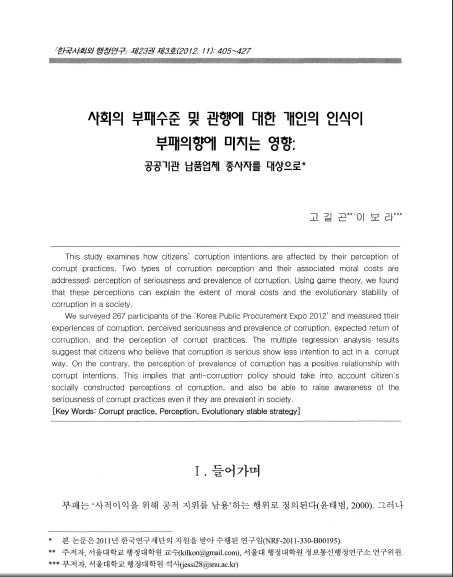 Kilkon Ko and Bora Lee. (2012) Perceived Societal Corruption Level and Tolerance of Corruption Practices and Their Impact on the Citizens’ Intention of Corruption. Korean Society and Public Administration 23(3). 405-427
Kilkon Ko and Bora Lee. (2012) Perceived Societal Corruption Level and Tolerance of Corruption Practices and Their Impact on the Citizens’ Intention of Corruption. Korean Society and Public Administration 23(3). 405-427This study examines how citizens’ corruption intentions are affected by their perception of corrupt practices. Two types of corruption perception and their associated moral costs are addressed; perception of seriousness and prevalence of corruption. Using game theory, we found that these perceptions can explain the extent of moral costs and the evolutionary stability of corruption in a society. We surveyed 267 participants of the ‘Korea Public Procurement Expo 2012’ and measured their experiences of corruption, perceived seriousness and prevalence of corruption, expected return of corruption, and the perception of corrupt practices. The multiple regression analysis results suggest that citizens who believe that corruption is serious show less intention to act in a corrupt way. On the contrary, the perception of prevalence of corruption has a positive relationship with corrupt intentions. This implies that anti-corruption policy should take into account citizen’s socially constructed perceptions of corruption, and also be able to raise awareness of the seriousness of corrupt practices even if they are prevalent in society.
2024-03-21
Read More -
 Soon Eun Kim. (2012) Perceptions of Factors Affecting Local Government Competitiveness. Korea Journal of Public Administration 50(3). 67-98
Soon Eun Kim. (2012) Perceptions of Factors Affecting Local Government Competitiveness. Korea Journal of Public Administration 50(3). 67-98This study aims to analyze the factors affecting local government competitiveness through Q methodology. Q statements, each of which represents a factor influencing local government competitiveness, are extracted from journals and books discussing those factors. The P sample consists of 40 respondents deeply involved in local government affairs, as professors and researchers, public officials, or representatives of citizen groups. This study produces three factors, each of which stands for a distinct view on the factors affecting local government competitiveness: views of local governance, local administration, and resident autonomy. The analysis supplies a few policy implications. A diversity of perspectives on the factors determining local government competitiveness imply that it is very difficult to decide the relative importance and significance of each factor because the importance of factors affecting local government competitiveness can be perceived differently by the various policy actors. The factors affecting local government competitiveness are dealt with differently according to their personal features, Notwithstanding this lack of consensus, statements in this study can be used as a basis for putting policy weight on each factor affecting local government competitiveness because the respondents are all experts in the affairs of local governments.
2024-03-21
Read More -
 Jesse W. Campbell and Tobin Im. (2015) PSM and Turnover Intention in Public Organizations: Does Change-Oriented Organizational Citizenship Behavior Play a Role? Review of Public Personnel Administration.
Jesse W. Campbell and Tobin Im. (2015) PSM and Turnover Intention in Public Organizations: Does Change-Oriented Organizational Citizenship Behavior Play a Role? Review of Public Personnel Administration.Not all employees contribute equally to the performance of their organizations, and the highest performers may have a disproportionate impact on organizational success. It is thus crucial for public organizations to retain top performers. Public service motivation (PSM) has been shown to be a differentiator of various types of individual job performance, and has also been linked to reduced turnover intention. This study examines the relationship between PSM, change-oriented organizational citizenship behavior (CO-OCB), and turnover intention using survey data from 16 central government ministries in South Korea. Analysis results suggest that CO-OCB plays a mediating role in the relationship between PSM and turnover intention, providing a creative outlet for the most intrinsically motivated employees that in turn strengthens their commitment to their organization. A number of implications of these findings are discussed.
2024-03-21
Read More -
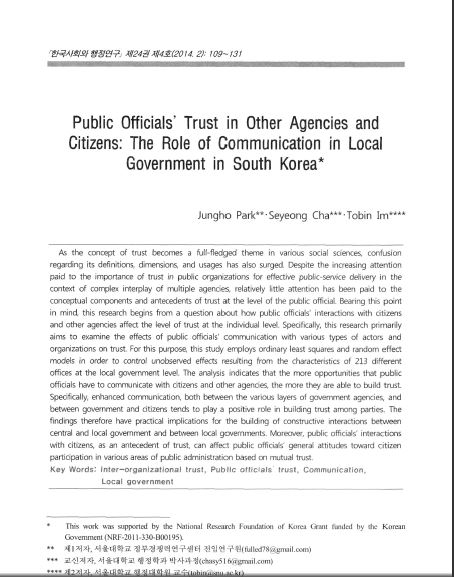 Jungho Park, Seyeong Cha and Tobin Im. (2014) Public Officials’ Trust in Other Agencies and Citizens: The Role of Communication in Local Government in South Korea. Korean Society and Public Administration 24(4). 109-131
Jungho Park, Seyeong Cha and Tobin Im. (2014) Public Officials’ Trust in Other Agencies and Citizens: The Role of Communication in Local Government in South Korea. Korean Society and Public Administration 24(4). 109-131As the concept of trust becomes a full-fledged theme in various social sciences, confusion regarding its definition, dimensions, and usages has also surged. Despite the increasing attention paid to the importance of trust in public organizations for effective public-service delivery in the context of complex interplay of multiple agencies, relatively little attention has been paid to the conceptual components and antecedents of trust at the level of the public official. Bearing this point in mind, this research begins from a question about how public officials’ interactions with citizens and other agencies affect the level of trust at the individual level. Specifically, this research primarily aims to examine the effects of public officials’ communication with various type of actors and organizations on trust. For this purpose, this study employs ordinary least squares and random effect models in order to control unobserved effects resulting from the characteristics of 213 different offices at the local government level. The analysis indicates that the more opportunities that public officials have to communicate with citizens and other agencies, the more they are able to build trust. Specifically, enhanced communication, both between the various layers of government agencies, and between government and citizens tends to play a positive role in building of constructive interactions between central and local government and between local governments. Moreover, public officials’ interactions with citizens, as an antecedent of trust, can affect public officials’ general attitudes toward citizen participation in various areas of public administration based on mutual trust.
2024-03-21
Read More -
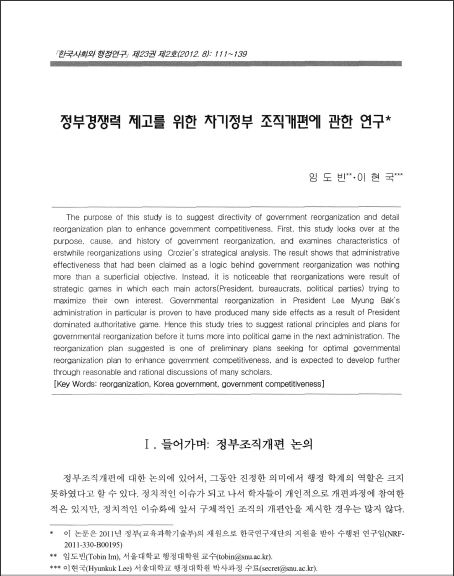 Tobin Im and Hyun Kuk Lee. (2012) Reorganization of Next Government to Enhance Government Competitiveness. Korean Society and Public Administration 23(2). 111-139
Tobin Im and Hyun Kuk Lee. (2012) Reorganization of Next Government to Enhance Government Competitiveness. Korean Society and Public Administration 23(2). 111-139The purpose of this study is to suggest directivity of government reorganization and detail reorganization plan to enhance government competitiveness. Fist, this study looks over at the purpose, cause, and history of government reorganization, and examines characteristics of erstwhile reorganizations using Crozier"s strategical analysis. The result shows that administrative effectiveness that had been claimed as a logic behind government reorganization was nothing more than a superficial objective. lnstead, it is noticeable that reorganizations were result of strategic games in which each main actors(President, bureaucrats, political parties) trying to maximize their own interest. Governmental reorganization in President Lee Myung Bak"s administration in particular is proven to have produced many side effects as a result of President dominated authoritative game. Hence this study tries to suggest rational principles and plans for governmental reorganization before it turns more into political game in the next administration. The reorganization plan to enhance government competitiveness, and is expected to develop further through reasonable and rational discussions of many scholars.
2024-03-21
Read More -
 Tobin Im, Jesse W. Campbell and Seyeong Cha. (2013) Revisiting Confucian Bureaucracy: Roots of the Korean Government's Culture and Competitiveness. Public Administration and Development 33(4). 286-296
Tobin Im, Jesse W. Campbell and Seyeong Cha. (2013) Revisiting Confucian Bureaucracy: Roots of the Korean Government's Culture and Competitiveness. Public Administration and Development 33(4). 286-296This paper looks at Korea's Chosun dynasty bureaucracy and the Neo-Confucian principles that formed the basis of its governing philosophy. We argue that Korea's traditional bureaucracy had a number of modern characteristics, including a system of formal and informal checks on the powers of the sovereign and a decision-making system that encouraged deliberation among highly qualified civil servants. On the basis of this exposition, we also argue that there are strong links between the traditional bureaucracy and its current, modern form. We firstly show how the institutionalization of a strong state during the period of rapid development was as much a return to traditional governing principles as it was a revolution and, secondly, how contemporary organizational culture is shaped by Korea's Confucian heritage. In the final section, we argue that the distinctive characteristics of the Korean bureaucracy have played an important role in limiting the success of a number of Western-oriented reform efforts.
2024-03-21
Read More -
 Kilkon Ko, Hyunwoo Tak and Daejoong Kim. (2014) The Analysis on the Existence and the Factors of Welfare Trap in Korean Financial Support Programs for Job Creation. Korean Policy Studies Review 23(1). 99-125.
Kilkon Ko, Hyunwoo Tak and Daejoong Kim. (2014) The Analysis on the Existence and the Factors of Welfare Trap in Korean Financial Support Programs for Job Creation. Korean Policy Studies Review 23(1). 99-125.This study examines whether a welfare trap exists in “Korean Financial Support Programs for Job Creation,” and analyzes the causes and policy implications of this potential welfare trap. Despite the challenges that welfare traps pose for job creation programs, preceding works have mainly focused on the economic impact of the program based on employment rate. These have neglected to present thoughtful empirical study regarding the existence and causes of the welfare trap in the program. While conducting this study, we built a database of support programs for job creation containing 3,305,173 people (2005-2011) from the government’s il-moa system, and utilized it to conduct analyses, with modification. From this data, we determined the existence of the welfare trap by measuring the degree of repetitive participation in the same program, and the degree of overlapping participation in multiple programs for a long period of time. Also, we examined the causes of the welfare trap through regression analysis using program participant characteristics as an independent variable. The result shows that 49,258 people (approximately 1.5% of total participants) remained in the program for more than 1,000 days. This implies that repetitive participants and overlapping participants do exist. However, from the factor analysis on participants who have fallen into the welfare trap, we find double-peak distribution, particularly in youth and the elderly, meaning that an identical welfare trap can emerge with different results according to the characteristics of participants. The analysis of major participating programs by different age groups supports this result as well. This suggests that repetitive and overlapping participation in financial support programs for job creation is not necessarily an unfavorable welfare trap, and also has the positive effect of supporting social security not guaranteed by private labor market.
2024-03-21
Read More -
 Hyun Kuk Lee. (2014) The Conceptualization of Government Competitiveness: Seoul Citizen Attitudes towards the Components of Government Competitiveness. Korea Journal of Public Administration 52(2). 120-153
Hyun Kuk Lee. (2014) The Conceptualization of Government Competitiveness: Seoul Citizen Attitudes towards the Components of Government Competitiveness. Korea Journal of Public Administration 52(2). 120-153Previous concepts and components of national competitiveness and government competitiveness were constructed solely by experts. Alfred Ho and Tobin Im criticized these concepts for focusing on a business-friendly environment, and that the measurements had been done mainly on entrepreneurs and their businesses. Ho and Im have tried to suggest a new citizen-oriented concept of government competitiveness, but it is still considered to be expert-oriented. This study utilizes a citizen survey to examine the validity of components of government competitiveness. The survey includes questions such as “What kind of government is highly competitive?” and “What is required for higher government competitiveness?” The research categorizes the responses by respondent age, income, and education level to see how these factors may affect the responses. It concludes with policy implications for the conceptualization of government competitiveness and its components.
2024-03-21
Read More -
 Jungho Park. (2014) The Effects of Government’s Information-Providing on Trust in Government and Service Satisfaction: Seoul Metropolitan Case. The Korean Journal of Local Government Studies 18(1). 291-313
Jungho Park. (2014) The Effects of Government’s Information-Providing on Trust in Government and Service Satisfaction: Seoul Metropolitan Case. The Korean Journal of Local Government Studies 18(1). 291-313This research aims to present more concrete evidence for the importance of government`s efforts to provide sufficient and accurate information to citizens via various communication channels. For this purpose, this research investigates the role of government`s information-providing to citizens to enhance trust in government and service satisfaction. Given that citizens` trust in government and satisfaction are subjective cognition or attitude, more sufficient and accurate information is likely to affect the degrees of trust and satisfaction by stimulating citizens to adjust their subjective attitude and bias. Specifically, this research hypothesizes 1) the positive role of information in increasing citizens` trust in government, and 2) the significant relationship between information and service satisfaction. In addition, this research attempts to offer theoretical explanation for how information providing can serve as a critical antecedent of trust and satisfaction in light of expectancy-disconfirmation theory. Findings of this research illustrate that government`s information-providing positively affects both trust in government and service satisfaction. In addition, findings suggest that future research should pay a closer attention to the mediating role of transparency and responsiveness in the relationship between information-providing and trust in government.
2024-03-21
Read More -
 Tobin Im, Hyun-Jung Jung, and Eun-Young Kang. (2012) The Effects of Policy Understanding on the Perception of Policy Performance by the General Public. The Korean Governance Review 19(2). 1-29
Tobin Im, Hyun-Jung Jung, and Eun-Young Kang. (2012) The Effects of Policy Understanding on the Perception of Policy Performance by the General Public. The Korean Governance Review 19(2). 1-29This study aims to test empirically the effect of policy understanding on the evaluation of government policies by the general public. Based on the 2010 Citizen Perception Survey conducted by The Knowledge Center for Public Administration and Policy, this paper examines whether the understanding of policy at the individual level affects the perception of the performance of public policy. Our regression analysis shows that negative evaluations of the performance of government policies on the part of citizens are significantly related to lower levels of policy-related knowledge and understanding. Furthermore, according to a comparative analysis of citizen groups at higher and lower levels of policy understanding, those with a higher level of understanding tend to value polices in a more positive way. In contrast, those with a lower level of understanding appear to value the polices negatively. These results suggest that the level of policy understanding plays a moderating role in the relations between other factors and the perception of policy performance. The results of this study imply that policy understanding on the part of the public plays an important role in successful policy implementation. Secondly, the results provide empirical support for normative arguments which have recommended paying attention to the level of policy literacy among the public.
2024-03-21
Read More -
 Tobin Im and Hyun Kuk Lee. (2012) The Importance of Applying the Concept of ‘Space’ to the Study of Public Organization for the Government Competitiveness Enhancement. Korean Review of Organizational Studies 9(2). 1-33
Tobin Im and Hyun Kuk Lee. (2012) The Importance of Applying the Concept of ‘Space’ to the Study of Public Organization for the Government Competitiveness Enhancement. Korean Review of Organizational Studies 9(2). 1-33This study presents the necessity of applying the concept of ‘space’ to the study of public organization based on the comparative analysis on office layout of government of Korea, Japan and that of US. Differently from the existing view on ‘space’ that is limited to the concept of ‘physical space’, we extended the meaning of ‘space’ to more inclusive concept, ‘spaciality’, which covers from the physical space to the subjective perception on space. The elements influencing spaciality can be categorized as organization structure, the characteristics of work, the culture of organization, difference between public organization and private one. Based on these precedents of spaciality, we suggested the possibility of applying the concept of ‘spaciality’ on organization study. We suggest this approach if useful because, spaciality is inter-wined with the job satisfaction, activating communication among office colleagues, satisfaction of citizen(or client) based on the comparative analysis of office layout of Korea, Japan and US.. As a result of analysis, we could find out the office layout of Korea and Japan government the administrative culture of which is authoritative tends to pursuit office of open structure that promotes interactive communication and collective decision. On the contrary, the office layout of US the administrative culture of which values on privacy and autonomy has closed structure that promotes personal boundary of space and work. This office layout is assumed to reflect the position classification system and the clear cut work allotment of US.
2024-03-21
Read More -
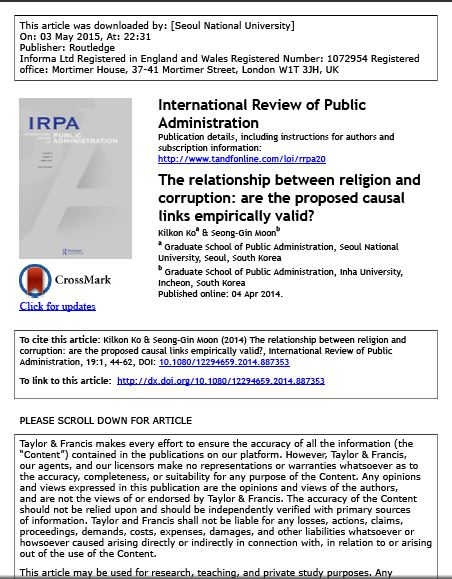 Kilkon Ko and Seong-Gin Moon. (2014) The relationship between religion and corruption: are the proposed causal links empirically valid?. International Review of Public Administration 19(1). 44-62
Kilkon Ko and Seong-Gin Moon. (2014) The relationship between religion and corruption: are the proposed causal links empirically valid?. International Review of Public Administration 19(1). 44-62There is a growing interest in understanding how religion affects corruption. Many empirical studies have suggested that countries with strong hierarchical religions (such as Islam, Catholicism and Orthodox Christianity) are more likely to suffer from corruption. These results are, however, controversial, largely due to the lack of empirical validity of the causal (or theoretical) links that explain such a relationship: obedience to authority, negative culture reinforcement, amoral familism and trust intermediation. Using the fourth wave World Values Survey (n = 87,988) of 64 countries, this study constructed a general estimation equation model to evaluate these four causal links after controlling for heterogeneity of individuals’ religious beliefs among the 64 countries. We did not find strong evidentiary support for the causal explanations.
2024-03-21
Read More -
 W. Wang and Youngmi Choi. (2015) The Rise of China and Maritime Territorial Disputes in East Asia: Comparing Approaches. Korea and Japan Military Culture Studies 19. 131-154
W. Wang and Youngmi Choi. (2015) The Rise of China and Maritime Territorial Disputes in East Asia: Comparing Approaches. Korea and Japan Military Culture Studies 19. 131-154Since 2000, China has expanded its sea power surpassing its past ability limited to the land. Along the China’s efforts to expand its leadership in East Asia, the ongoing crisis sparked by the maritime territorial disputes where China has involved appears to deepen. In general, there are three approaches to explain the reasons for the crisis intensification: a) China’s efforts to break a siege by the U.S. and Japan, b) China’s expanded benefits related to the debatable lands, and c) China’s intention to divert the nation’s attention on internal troubles to international conflict. This study finds the Diaoyudao conflict with Japan is better explained with China’s efforts to break a siege by the U.S. and Japan while the Spratly Islands dispute with five Southeast Asian countries is well discussed with China’s expanded benefits in the South China Sea. However, both disputes is less likely to be explained by the China’s diversionary intention.
2024-03-21
Read More -
 Jesse W. Campbell and Wonhyuk Cho. (2014) Two Faces of Government-Business Relations During South Korea's Developmental Period. The Korean Association for Comparative Government 18(1). 47-66
Jesse W. Campbell and Wonhyuk Cho. (2014) Two Faces of Government-Business Relations During South Korea's Developmental Period. The Korean Association for Comparative Government 18(1). 47-66South Korea's economic development has been characterized as a miracle due to its unprecedented speed and success. However, it has also been noted that a high level of distributive equity and poverty reduction were achieved in parallel with rapid growth. This paper argues that the first-order development goals of the state throughout the 1960s and 1970s were pursued in such a manner so as to be maximally inclusive of citizens in the developmental project. It is further argued that the country's industrial conglomerates played a dual function as engines of economic growth and instruments through which citizen wellbeing was enhanced. This paper reviews the mechanisms by which the Korean government influenced business, and discusses Korea's multifunctional industrialization and labor policies. Finally, the deinstitutionalization of the business sector's multifunctional role is detailed, and future challenges for Korea's modern welfare state are suggested.
2024-03-21
Read More

